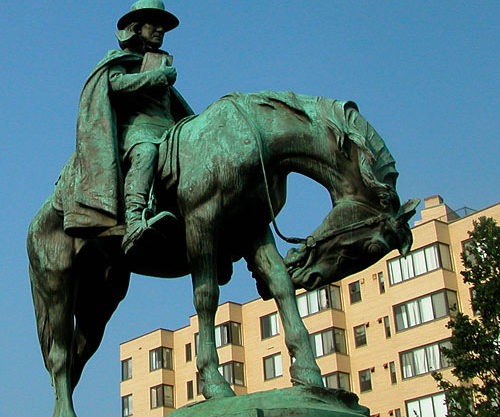Regardless of your politics, but dependent on the plans of God, there will be a November 9, 2016. Do you know the day? It’s the day after the United States of America will choose between Donald Trump and Hillary Clinton. Between now and then, there will be a lot of debate, discussion, and Tweeting. But that day will come and, regardless of the victor, the church’s mission in the USA will continue.
Do you have a vision beyond November the 8th?
It’s hard to imagine a more polarizing political atmosphere, but Methodism may have already faced one. John Wesley, no supporter of democracy, was a sharp critic of the war between the colonies and the crown. On the other hand, Francis Asbury was the only British-born itinerant minister to stay in the colonies during the war. Asbury then remained for 30 more years, dying this side of the Atlantic, seeing the Methodist movement become a powerful force; ministering while there were arguments for individual freedom and corporate unity and conflicts between people of Irish and English descent. (For more information, see Bryan Easley, “The Leadership of Francis Asbury,” from Leadership the Wesleyan Way, Emeth Press.) Asbury realized that in spite of the short-term conflict, there would be a long-term mission.
Likewise for any Christians in the USA, without minimizing the importance and efforts that will lead up to November 8, there will be a November 9. There will be a mission that continues. And it is vital that missional seeds are sown even before November 9. This essay tries to outline the current political atmosphere in order to create empathy across political lines to provide space for a November 9 mission, an Asburian vision of a mission beyond the conflict.
 Let me begin with a quick historical recount, helping to frame how we have arrived at today. The Modern period is captured in the Enlightenment, the intellectual spirit of the age that reason was the highest authority. It championed critical thinking. The Enlightenment promised a better life through better government, greater personal freedom, medicine, and scientific discovery. It delivered in huge ways. It produced a lot of wealth, health, and possibility.
Let me begin with a quick historical recount, helping to frame how we have arrived at today. The Modern period is captured in the Enlightenment, the intellectual spirit of the age that reason was the highest authority. It championed critical thinking. The Enlightenment promised a better life through better government, greater personal freedom, medicine, and scientific discovery. It delivered in huge ways. It produced a lot of wealth, health, and possibility.
But not as much as expected. And at times it ran aground. There was WWI and WWII. There was a Holocaust. The great advancements of the Enlightenment also created the possibility for great conflicts and great destruction and death. In light of these derailments, a new spirit, a Postmodern spirit, emerged in the late 20th century. Whatever this age would be, it would not succumb to the arrogance of the Modern period. It challenged the big, bad rationalist account of the world. It saw that all our understandings of reality (even scientific ones) are from certain points of view. It is not that each perspective is not true, but that each is incomplete.
To avoid this arrogant, rationalist, outward turn, the Postmodern period turned inward. Discovering truth in the objective world had led to the control and death of human beings—Berlin Walls, Israels/Palestines, concentration camps, industrialized work and abuses. The inward turn would not let other people discover what it meant to be human; it would allow—even demand—that each person find what it means to be human for him/her/vem/xer/perself. Here was the beauty of Postmodern movement: If the Modern period had the Enlightenment where “rationalist” was the only lens, then the Postmodern period would apply multiple lenses to everything. Each person has a lens and each lens is valid.
The multiple lens approach meant that we would value every lens we could identify: the lenses of being a woman, being gay, being Black, being poor, being an immigrant, being native, and so forth. The more lenses, the better. Many lenses proved to sharpen focus and to examine things from multiple points of view, holding the potential for growth in knowledge, understanding, and progress. However, one unnecessary result was that the value of those sociological lenses that were previously established (wealthy, white, male) were now disregarded—officially, at least. Those lenses were to blame for violence, abuse, and control. Let’s bring this back to the political realm. In politics, the advantage of having a lens that was previously unconsidered was called being an “outsider.” If you weren’t part of the “political establishment,” then you brought a fresh perspective and a citizenry would benefit from such leadership.
Through all of this cultural development, four very important things (among others) happened:
1. Global migration
2. 9/11 and global terrorism
3. Social media
4. Seven Billion Cell Phones
Suddenly, things that were happening all over the world were brought not just into our homes, but into our faces; and not from a framed perspective by news media, but from multiple perspectives from various amateur  videographers; and not only were these perspectives from other countries, but they were shared by other people who now lived up the road from us and who worked next to us and who received a burger from us at McDonald’s and who fixed our computer and who built our house and who married our Dad, daughter, or cousin; or who became our MP, Senator, Governor. Suddenly, diversity was not simply a theory that could help bring beauty, technological advancement, and new restaurants; it became a next door reality that became, at least for some people, scary. The world that was imagined in the 1980s and 1990s—a world of peace through multiple lenses—was being threatened. The promise that some had read into Postmodernism—a progressive peace through diversity—was being challenged. Rather than peace, there was more war, closer war, unframed war.
videographers; and not only were these perspectives from other countries, but they were shared by other people who now lived up the road from us and who worked next to us and who received a burger from us at McDonald’s and who fixed our computer and who built our house and who married our Dad, daughter, or cousin; or who became our MP, Senator, Governor. Suddenly, diversity was not simply a theory that could help bring beauty, technological advancement, and new restaurants; it became a next door reality that became, at least for some people, scary. The world that was imagined in the 1980s and 1990s—a world of peace through multiple lenses—was being threatened. The promise that some had read into Postmodernism—a progressive peace through diversity—was being challenged. Rather than peace, there was more war, closer war, unframed war.
In light of this quick historical recount, let me frame the two political candidates who will be voted on November 8:
1. Donald Trump. The Republican nominee is the result of some who want to be heard again, whose lenses were discarded when others were rising in importance. President Trump represents for many the white, male voice. I know some think the white, male voice has never stopped being heard, but their perspective has lost all power. Remember the credit crunch? Don’t trust the bankers! Down with CEOs! Has anyone ever heard of someone studying “Masculine” or “Man Studies” in University? Mr. Trump is all of the things that capture what people thought stopped being important in the Postmodern turn—and he is a political outsider. Some people remain surprised he has a chance at being President. Quite the opposite is true. If he—the wealthy, white, male, political outsider—hadn’t become an option for President, we should have been surprised.
2. Hillary Clinton. The Democratic nominee is the politician who has moved with the spirit of the age. She works (very hard!) to use every lens that she might encounter—every gender, every woman, every sexuality, every economic sphere. But here’s the irony: The belief that one can hold every perspective means a rejection of those perspectives which do not believe certain lenses exist or that certain lenses are helpful or that holding every lens is advisable or that do not share desires that people with other lenses do. This conflict results in, say, a basket of deplorables problems. Suddenly, lots of people feel unheard, unconsidered, mistreated, and disrespected. Why didn’t they get to participate in what it meant to be human like everyone else did? Why doesn’t their lens count anymore?
Now, note the irony. Mrs. Clinton is herself a fresh lens—the first potential woman president—who purports to value multiple lenses, but she is also the consummate political insider. She is the archetype postmodern politician.
On November 9, the issues that were used to frame opponents, reject candidates, and solidify voting blocs will remain. The election will be decided; the mission will continue. Will we have any Francis Asburys who can see beyond the conflict, to craft the next 30 years of mission advancement? Will we have any Francis Asburys who ministered in the midst of conflict, gave up his status, “[e]mbracing humanity [by] being vulnerable in relationships, finding appropriate ways to connect and relate to others, and learning from their perspective”?
Let me offer several kinds of persons that Asbury might relate to in our day:
People whose previously strong, bustling city has turned to garbage and decay over the last 30 years, while no one has cared to listen to their opinion;
People whose home as a child was far better, safer, and joyful than the house they’re providing for their own children;
People who have started feeling increasingly heard and valued in the last 20 years but who fear it will all be taken away;
People whose life and meaning have been based on ancient values that are now increasingly threatened while they are called hateful and legally forced to separate their personal convictions from how they make their living;
People who have escaped cycles of poverty but who still see their extended family stuck in drug abuse and economic poverty; who worry that they might be drawn right back into these cycles once their playing career is over.
These are people often on different sides of the political fence, but who stand before God’s people for missional service. Will we have any Francis Asburys on November 9, people with a vision for a future beyond the conflict? People with courage of conviction that Jesus is raised from the dead, is the definitive word of God, and whose lives have been transformed and empowered by the Holy Spirit, yet people with humility to sacrifice their status, empathize with another, and relate to those whom God brings into their lives?
Asbury had a vision beyond the war and we are part of his vision bearing fruit. May we emulate his ability to see beyond out immediate conflicts, as well.




 My Bachelor’s degrees are in Social Work and Sociology. I have worked with children on the autism spectrum for several years. I acted as a case manager coordinating the team that worked with the children and their families through an intensive in-home program.
My Bachelor’s degrees are in Social Work and Sociology. I have worked with children on the autism spectrum for several years. I acted as a case manager coordinating the team that worked with the children and their families through an intensive in-home program.



 ter our trip to the mercy ministry where I encountered the woman described above, we visited another ministry, a place called Daughters of Hope. Founded by a young couple impassioned by the concept of business as missions, Daughters of Hope is committed to bringing hope to deeply impoverished women. Most of them come to “Daughters” from a place of despair. Many have alcoholic husbands; all of them are the primary providers for their home. Most would be unemployable in Bangalore due to lack of education, lack of opportunity or lack of language skills. I found myself again speaking this word from Isaiah over the 60 women employed at Daughters of Hope, as I shared with them from the Word. I got to tell them that they are not forgotten; that they are treasured, valued, remembered. And then I told them about the story Jesus tells about treasures. He once said (Matthew 13:44) that the Kingdom of Heaven is like a treasure hidden in a field, which a man found and covered up. Then in his joy he goes and sells all that he had and bought it. I told them that they are the treasure in this field called India, which God has purchased with the blood of Jesus Christ. He bought that field so he might have them as his own daughters.
ter our trip to the mercy ministry where I encountered the woman described above, we visited another ministry, a place called Daughters of Hope. Founded by a young couple impassioned by the concept of business as missions, Daughters of Hope is committed to bringing hope to deeply impoverished women. Most of them come to “Daughters” from a place of despair. Many have alcoholic husbands; all of them are the primary providers for their home. Most would be unemployable in Bangalore due to lack of education, lack of opportunity or lack of language skills. I found myself again speaking this word from Isaiah over the 60 women employed at Daughters of Hope, as I shared with them from the Word. I got to tell them that they are not forgotten; that they are treasured, valued, remembered. And then I told them about the story Jesus tells about treasures. He once said (Matthew 13:44) that the Kingdom of Heaven is like a treasure hidden in a field, which a man found and covered up. Then in his joy he goes and sells all that he had and bought it. I told them that they are the treasure in this field called India, which God has purchased with the blood of Jesus Christ. He bought that field so he might have them as his own daughters. By herself. She would prove by her own experience that the tree had no power. The village leaders were mortified by this announcement and begged her not to follow through with her plan. They warned her of what would surely happen if she went near this tree, but she refused to listen. That night, the social worker went out and made a bed under this cursed tree, then laid down and proceeded to have a peaceful sleep. The next morning, the social worker awoke at dawn, to find herself surrounded by the entire village – plus a few from neighboring villages! They’d come to see if she was still alive, which indeed she was. Seeing the crowd, she stood up beneath that tree and shared the great news about Jesus Christ and the power of God Almighty. In one day, half the village became followers of Jesus.
By herself. She would prove by her own experience that the tree had no power. The village leaders were mortified by this announcement and begged her not to follow through with her plan. They warned her of what would surely happen if she went near this tree, but she refused to listen. That night, the social worker went out and made a bed under this cursed tree, then laid down and proceeded to have a peaceful sleep. The next morning, the social worker awoke at dawn, to find herself surrounded by the entire village – plus a few from neighboring villages! They’d come to see if she was still alive, which indeed she was. Seeing the crowd, she stood up beneath that tree and shared the great news about Jesus Christ and the power of God Almighty. In one day, half the village became followers of Jesus.